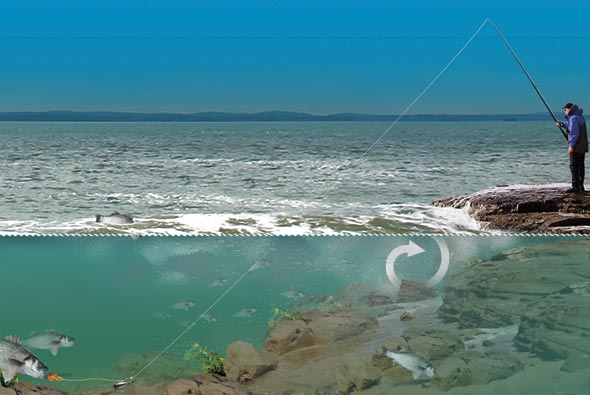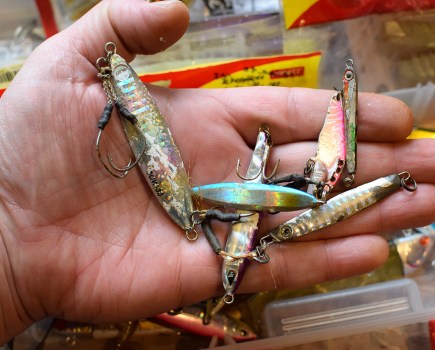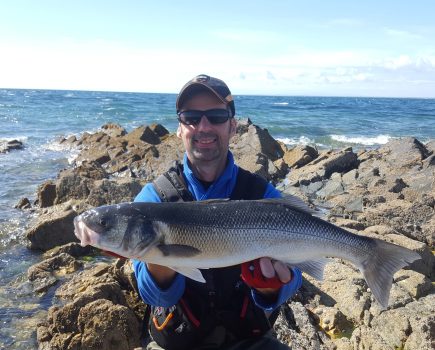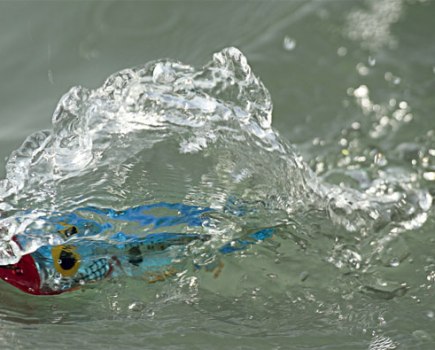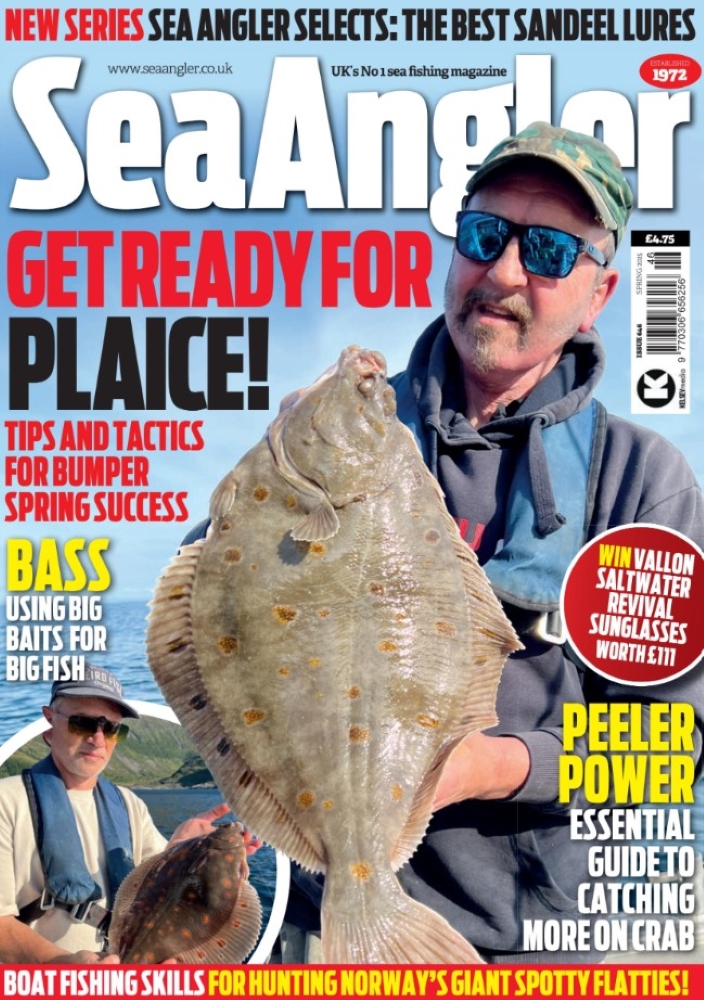Big bass are said to be difficult to catch, yet record-breakers are so often fluked by complete novices. If you want to catch one, Alan Yates has two pieces of advice… first cast short and then sit and wait
Serious bass fishing takes time…
Dedicated bass anglers pull their hair out when they hear a novice has fluked a fish of a lifetime.
But this tells us something about the bass, which is that it hugs the shoreline and is not averse to grabbing a large untidy bait dropped short because of a bad cast.
As a junior I was raised catching bass with my father, and he and his best angling mate were absolute fanatics.
They thought nothing of spending hours biteless in the quest for the odd red-letter day or specimen. That may be why I took up match fishing – to me, waiting hours for one bite was brain-numbing, although I do understand why there are anglers that get their kicks from this type of sport.
Bassing by attrition is still the best tactic, although modern society’s need for an instant fix means there are very few sea anglers prepared to put in the hours, which is why many quality shore bass are caught by accident.
Bass are a shoal species and when small can be suicidal, but once over 2-3lb they are far less likely to be caught in numbers.
A shortage of bass over 5lb could be something to do with their extremely slow growth rate. A 10lb bass is likely to be 20 years old, and returning the large fish – something I have been advocating for years – is now accepted as the best conservation practice for the species.
Big bass appear as loners, but this is entirely down to the size of the shoal, which reduces with time.
The species is a member of the perch family, renowned for its patrolling shoal instinct, and bass are very territorial and patrol their section of the sea vigorously.
My father’s tactic was to ambush the bass, and he had a series of different spots he would move to on the different states of tide.
On occasions he would catch two or more fish, on others none for weeks, and that’s what you face if you take up fishing for bass.

WHERE TO CATCH BASS Each choice has its own methods and best times
 Bass are common to a range of different venues, and although the short cast theme is continuous, no single bass fishing bait or tactic will catch everywhere. Much depends upon the venue, the season and the weather conditions.
Bass are common to a range of different venues, and although the short cast theme is continuous, no single bass fishing bait or tactic will catch everywhere. Much depends upon the venue, the season and the weather conditions.
■ Rock/beach bass: By far the most common venue around the UK to catch bass is from beaches and mixed-ground shorelines edged by rock reefs and weed.
Venues of mixed ground are home to the bass’s favourite food, crabs. From spring the bass feed on the common shore crabs when they shed their shells, then through summer the fish switch to edible crabs and velvet swimmers and, in an increasing number of regions, spider crabs. Between times prawns, small fish and sandeels are also a target. Beach bass are not averse to taking a large mackerel or squid bait and, into autumn and early winter, a live pout or whiting.
Rough-ground venues tend to fish when the sea is rough and coloured, with the first of the flood tide best and, when the sea is calm and clear, flood tides that coincide with dusk or dawn.
■ Surf bass: Surf fishing for bass is the classic style. Casting a lugworm or peeler crab bait into a raging surf spawned the classic surf bass rod, and it is the Irish surf strands that are famed for this.
However, surf venues are limited and the sea needs to be stirred to produce the perfect conditions that attract the bass to feed. The first of the flood as it pushes across the sand is often the hot time.
■ Pier bass: Catching big bass from a pier is a comparatively modern style and came about because many mackerel anglers headed and gutted their catch before leaving the pier (and some beach and rock marks). This led to the bass moving in with the tide to feed on the heads and guts.
Some South Coast piers produce big bass to large mackerel heads, flappers and fillets fished alongside the wall or around the pier piles. Tide is the key to the best fishing, with the early tide generally the top time.
IS THIS THE ULTIMATE? Big bass rewards require real dedication
Bass fishing is the ultimate in specimen hunting. Fishing with one rod and one bait for hours, waiting for the big one to hit the bait, requires dedication, but the rewards can be special.
With time the bass angler will build up a picture of bass movement on the venues being fished, along with the best time to fish.
Bass bites are usually strong – either a slack liner or the rod dragged over. You can use a rod rest or hold the rod, but don’t leave your rod unattended.
Some anglers find casting short difficult. Casting inside 50 yards is essential, and on occasions even 12 yards can be enough.
Over rocky ground an accurate plop into a gulley can put your bait in front of fish, and a knowledge of the low-tide terrain is a big advantage, so check it out.
■ Landing bass: In most situations you can use the waves to help you beach your bass, but don’t drag it on the hook snood alone – use the waves and then pick the fish up once it is grounded, or use a net.
Bass have a spiky dorsal fin which will draw blood, but far more risky to your hands when handing fish are the edges of the gills, which are razor sharp.
Pick a bass up safely by its mouth, or draw it gently over a flattened-out palm of the hand.
RIGS FOR BASS From running leger to pulley
The classic bass rig for rough ground is the simple running leger, a variation of which is the running paternoster or the one-hook fixed paternoster.
For really rough ground the pulley rig, shown right, is a favourite.
Large baits are essential, and a hook size of 3/0 upwards is suitable for baits like a peeler crab or mackerel fillet, with a 6/0 the hook for a mackerel head or a live fish. Atwo-hook Pennell rig can also be an advantage for larger squid or crab baits.
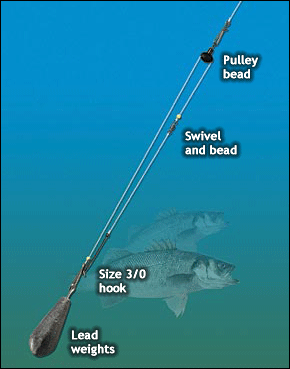 THE BEST BASS BAITS There’s something for every occasion
THE BEST BASS BAITS There’s something for every occasion
A whole peeler crab is the hot bait on many rock venues, with the largest jelly softies deadly when available. Fish one on a float along a pier wall or on a leger.
Lugworms catch school bass on the surf beaches and Irish strands, but do not catch so well over rough ground.
Other worm baits like ragworms and maddies catch bass in surf, although these are more likely to attract flounders.
A large mackerel is good from summer beach marks, rocks and piers, while a whole Calamari squid works in autumn.
A small live lip-hooked pouting or whiting fished on the surface is a great autumn and early-winter bait from beaches and piers, especially after dark.

